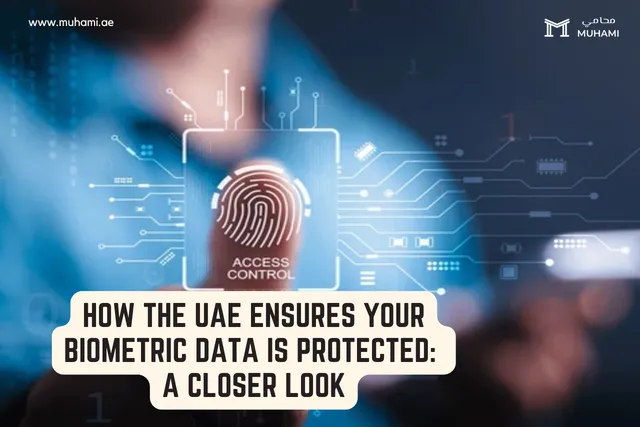How the UAE Ensures Your Biometric Data is Protected: A Closer Look

The UAE's regulatory framework for biometric data protection addresses the proliferation of biometric authentication systems across government, financial, and healthcare sectors.
Federal Decree-Law No. 45 of 2021 (Personal Data Protection Law or PDPL), effective January 2, 2022, establishes the statutory foundation for biometric data governance.
The legislation applies to controllers and processors operating within the UAE and extends jurisdictional reach to foreign entities processing personal data of UAE residents or offering services within the Emirates.
CLASSIFICATION AND PROCESSING REQUIREMENTS
The PDPL defines biometric data as 'personal data' resulting from processing using a specific technology related to the physical, physiological or behavioural characteristics of the data subject, which allows the identification or confirmation of the unique identification of the data subject, such as facial images or fingerprints. This data is classified as sensitive personal data alongside genetic, health, and financial information.
Processing requires explicit, informed, and revocable consent specific to the biometric purpose. Consent must be separate from general terms and freely withdrawable. Controllers must publish privacy notices detailing data types collected, processing purposes, retention periods, data-subject rights, and complaint procedures before commencing biometric processing.
Purpose limitation restricts collection to clear, legitimate, and specified purposes while data minimisation mandates gathering only necessary data. Upon purpose fulfilment, controllers must delete or irreversibly anonymise biometric data unless UAE banking or health regulations mandate retention.
SECURITY AND CROSS-BORDER TRANSFER REQUIREMENTS
Controllers and processors must implement technical and organisational measures protecting biometric repositories, including encryption at rest and in transit, pseudonymization, multi-factor access controls, secure key management, audit logging, and incident-response protocols. Regular security audits and staff training comprise part of the statutory accountability framework.
Cross-border transfers require either adequate protection designation by the Minister of Economy, approved safeguards such as standard contractual clauses or binding corporate rules, or explicit data-subject consent. Controllers must disclose transfer mechanisms in privacy notices and maintain detailed transfer records.
SECTOR-SPECIFIC OBLIGATIONS
Financial institutions under UAE Central Bank Consumer Protection Regulations must collect minimal customer data, secure against unauthorised access, notify the Central Bank of material breaches, and retain customer-due-diligence records for five years.
Healthcare providers under Federal Decree-Law No. 2 of 2019 on Information and Communication Technology in Health Fields must implement encryption, access controls, audit trails, and staff training for biometric data used in telemedicine and patient identification.
Telecommunications operators under Telecommunications and Digital Government Regulatory Authority Consumer Protection Regulations must implement appropriate security measures to protect subscriber information and comply with PDPL requirements, including notifying the UAE Data Office of personal-data breaches within 72 hours while adhering to consent, purpose-limitation, and data-minimisation obligations.
ENFORCEMENT POWERS AND PENALTIES
High-risk processing activities, including large-scale biometric profiling or automated decision-making, trigger mandatory Data Protection Impact Assessments under Article 21.
Entities whose core activities involve large-scale sensitive data processing or systematic monitoring must appoint a Data Protection Officer to oversee compliance and liaise with the UAE Data Office. Given the complexity of regulatory requirements, many organizations consult a Technology Law Firm in UAE to ensure comprehensive compliance with biometric data regulations and cross-sectoral obligations.
The UAE Data Office enforces the PDPL through audits, investigations, and corrective orders. Controllers must notify the Data Office of personal-data breaches without undue delay and within 72 hours where feasible.
Administrative fines range from AED 50,000 to AED 5,000,000 for violations. Repeat offenders face escalated penalties, including operational suspension and license revocation. Serious breaches may trigger criminal prosecution under cybercrime laws with potential imprisonment.
These enforcement mechanisms reflect the UAE’s growing commitment to a unified and enforceable framework under the Data Protection Law UAE, aligning with international best practices while addressing local sector-specific concerns.
Organizations must conduct thorough Data Protection Impact Assessments before implementation, embedding privacy-by-design controls including encryption algorithms meeting international standards, secure key escrow systems, and biometric template protection mechanisms preventing reverse-engineering. Detailed consent-management platforms must enable users to provide, modify, or withdraw consent while maintaining verifiable records of all transactions.
Vendor contracts must specify data residency requirements, security standards, breach notification protocols, and liability allocation consistent with PDPL obligations.
Comprehensive staff training programs covering biometric data handling procedures and incident response protocols are mandatory. Incident-response procedures must establish clear escalation paths, forensic capabilities, and communication protocols aligning with the 72-hour breach notification requirement.
Any Questions?
Connect with lawyers and seek expert legal advice
Share
Find by Article Category
Browse articles by categories
Related Articles

Cash locked in VAT is cash you cannot u…
A practical guide to reclaiming VAT on commercial real estate in the UAE Two…

Cash locked in VAT is cash you cannot use to run …
A practical guide to reclaiming VAT on commercial…

Why FIDIC Red Book Contracts Must Be Am…
Introduction For Owners and Contractors in the UAE, the unamended FIDIC Red …

Why FIDIC Red Book Contracts Must Be Amended Befo…
Introduction For Owners and Contractors in the…

ADGM’s Substantial Public Interest Fram…
The Abu Dhabi Global Market (ADGM) has introduced new Data Protection Regulatio…

ADGM’s Substantial Public Interest Framework: Sha…
The Abu Dhabi Global Market (ADGM) has introduced…
